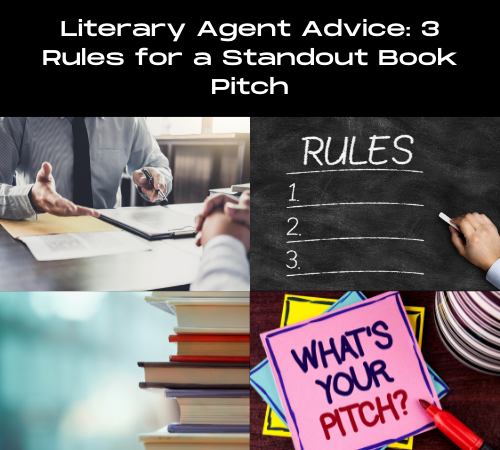Consider presenting your book concept to a literary agency?
It’s no enigma that each year, hundreds of book ideas and pitches land up in a mammoth-sized slush pile. What, then, will make your book concept stand out?
Literary agents must filter through a deluge of book proposals. Many of them fall short and are discarded. However, if a literary agency selects your book proposal, they will work with a publisher to bring your novel to reality.
Nota bene: This does not occur by chance.
If you’re serious about creating a book and approaching a literary agent for assistance in being published, the throw-this-together method seldom works.
You must think like a literary agent on what they are looking for. Consider this: More than half of the book proposals received by a literary agency are unsuitable. If you want to avoid falling into the pit of rejection, you must understand how to stand out.
Consider the following expert advice from a literary agent:
Rule 1: Become an Expert at Elevator Book Pitch

Are you wondering how to get the attention of a literary agent? Make it as simple as possible for them to develop an interest in your book concept, enough to pique interest. Consider it the book’s elevator pitch.
If you have ever pitched magazine article ideas to editors, you are already familiar with this process:
- Experiment with your elevator pitch. Before pitching a literary agent, you are likely to spend time considering your book concept, doing research, and perhaps conducting interviews. Reduce everything to an elevator pitch and rehearse it: “I am writing about…(describe it in a few sentences). This method will assist you in refining your book concept to craft an effective query letter.
- Query Letter. Compose a query letter to your literary agent that includes a brief synopsis, hook, or “elevator pitch.” Within the first few lines, capture their interest and draw them in.
Rule 2: Describe Book/Material Concept in Detail

You are ready to move on to the next section of your pitch after dialing in your elevator pitch for your book concept. Include the following:
- Explain the book’s aim (,nonfiction) or narrative information (,fiction).
- In a few paragraphs, summarize the book’s central ideas or themes.
- Include a list of two to three titles that are comparable or competitive. An excellent comparison title is a bestselling book that appeals to the same age group and genre as your work and is released within five years. It is okay to include the comparison titles in the query’s letter quick pitch session if you are wondering.
Rule 3: Demonstrate Street Credibility With An Engaging Bio

There is one more essential component of a book that many novice authors or writers overlook: biography.
It’s another chance to demonstrate to your literary agent that you are the ideal candidate to write your book and possess the necessary street credibility to make it happen. It should be included in a single succinct paragraph at the conclusion of your book pitch. Include the following:
- Writing experience and qualifications in a relevant field.
- How did you develop an interest in authoring this particular book or in writing in general?
- Links to author’s social media accounts or websites.
One-Page Book Pitch
Create a one-page book pitch to get the attention of a literary agent. Literary agents must filter through mountains of pitches, most of which are bad. Additionally, the overwhelming majority are too lengthy. If you are considering pitching a book to an agent to get assistance in finding a publisher, bear the following in mind:
The whole of your book’s long-form pitch or query letter should fit on a single page. That is all. There will be no lengthy pitch or novel-length writing.
A single page.
To condense your book pitch to one page, you will need to perform some hard editing, writing, and rewriting. However, the work is worthwhile.
If you follow this advice while writing a stand-out book pitch, you will increase your chances of convincing a literary agency to represent you. You are capable of doing this!
Are you looking for a literary agent? Handing your book to publishers is a daunting task. However, companies like Quantum Discovery can help you with your needs when having your book delivered to the right publisher. Contact our professionals by calling (888) 755-6875 or visit quantumdiscovery.net to know more.

Pingback: Quantum Discovery Receives an Author Testimony: Solidifying Their Ground in Providing Quality Services - Quantum Discovery